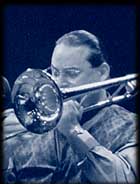
|
|
|
|
|
|
Photo Credit: Tim Owens |
Steve Turre
One of the least precise and more mystical musical instruments is the trombone. Clearly one of the latest jazz masters of that instrument is Steve Turre, who joins the Billy Taylor Trio for this enlightening edition of Billy Taylor's Jazz at the Kennedy Center. The mystery lies in the fact that the trombone is the only horn manipulated not by the use of keys, but with a slide mechanism. So precision is a tricky proposition. This is but one of the insights Dr. Taylor and his auspicious guest touch upon on this edition of the show. Steve Turre is a thoroughly modern musician who grew up musically in the San Francisco Bay Area. Billy marvels at how swiftly he is able to manipulate the cumbersome trombone. Turre responds to Billy's enthusiastic query "How do you play so fast?", with a cheeky "Its all in the tongue," as he and Taylor share a hoot. Steve is a real student of the instrument. He talks about how he started out listening to the classic tailgate style of the New Orleans trombonists, before falling under the influence of the great bebop master J.J. Johnson. Later, when he joined the band of the late saxophonist Rahsaan Roland Kirk, the latter encouraged him to check out the trombone styles of such greats as Trummy Young, Lawrence Brown, "Tricky Sam" Nanton and Quentin Jackson, whose styles fall in between the New Orleans sound and J.J. Johnson. A stint with the Thad Jones-Mel Lewis Orchestra placed him in the trombone section in the seat next to Jackson. Known as "Butter" for his smooth sound, Jackson helped to further broadening Turre’s knowledge. Billy asks Steve how he came to play the trombone. Turre responds by relating his father's humorous objections to his stated desire to play the violin, asking Steve's mother "have you ever heard a beginning violinist?" So Steve found the trombone to his liking, drawing laughter from the audience by posing the rhetorical question: "Have you ever heard a beginning trombonist?" Asked to demonstrate how he gets a personal sound, Turre talks about his use of dynamics, from soft and buttery to loud and boisterous. This discussion evokes a query from Dr. Taylor on Turre’s use of various mutes and plungers. An audience member asks Steve about his use of circular breathing techniques. After demonstrating, Turre credits Rahsaan Roland Kirk as his principle inspiration for such technique. As an adjunct to his trombone playing, Steve Turre has taken unusual steps to establish himself as the preeminent "shellist" in jazz. He has become proficient at blowing an array of seashells for musical expression. Billy recalls that, for one of his television profiles, he went down to Mexico with Steve and witnessed him actually diving for shells. Illustrating his uncommon proficiency on the shells, Steve and Billy's trio play a superb performance of Yusef Lateef's haunting tune "Morning." For this edition of the show Billy's trio and guest really stretch out, doing extended versions of the Miles Davis classic "All Blues," "Morning," and "Body and Soul." An added musical treat comes when Billy has Steve introduce his wife, cellist Akua Dixon Turre. Husband and wife proceed to play a sublime cello-trombone duet on Duke Ellington's "Echoes of Harlem," lending an unusual twist to the show -- a husband & wife first for Billy Taylor's Jazz at the Kennedy Center!
Don't miss Steve Turre in our Photo Gallery!
|
|
| |
This page and its contents Copyright© 1999 National Public Radio

